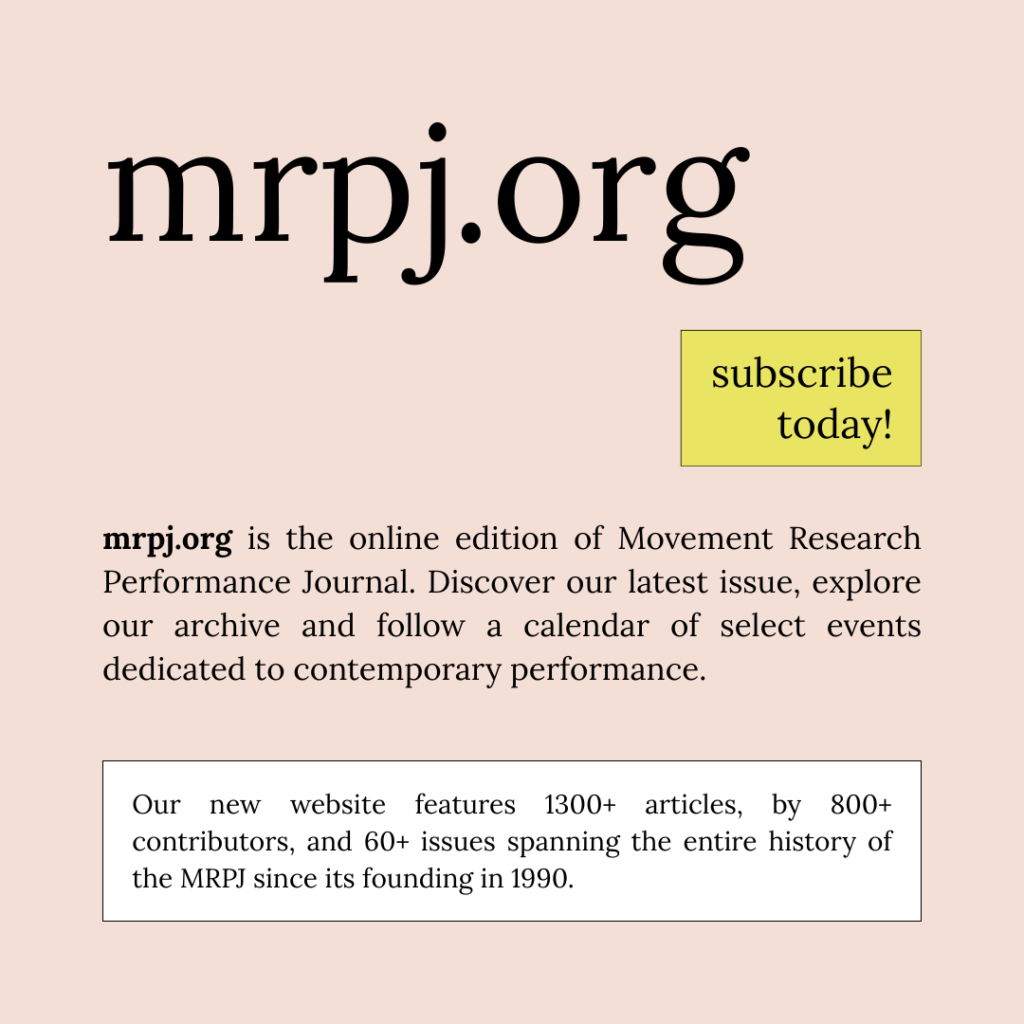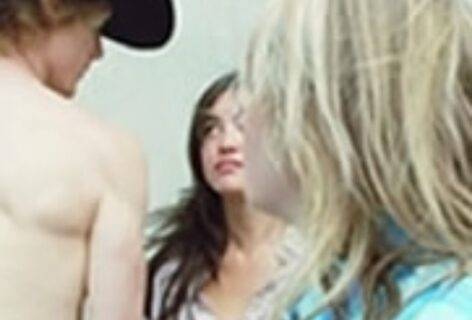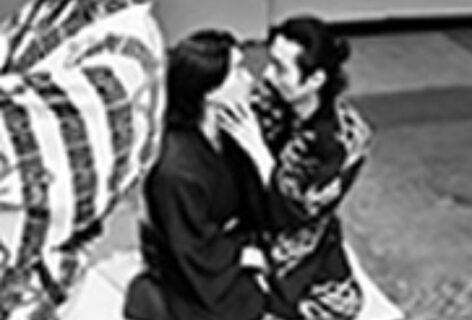Artist Sara Juli talks with choreographer Juliana May about her work as a fundraising consultant to independent artists and Juli’s 2006 work The Money Conversation, in which she handed out her life savings to members of the audience. As Juli says, “There’s nothing wrong with making art in your living room… but as soon as you want funding or you want money in a formal way, then you have to be prepared to answer difficult questions about your process, who you are, why it’s important, and why should I care?”
Interview Date: March 26, 2012
Download a PDF of this conversation
Juliana May: My relationship to money and dance has changed since we’ve been working together, for about two years now. I would love for you to talk a about your clientele a little bit. Who do you work with?
Sara Juli: I work with artists very similar to you [independent artists], largely because that’s a lot of the folks that I know. But the fundraising skills are transferable throughout the industry. I rarely say no to anyone.
Juliana: You rarely say no to anyone?
Sara: If someone is interested in learning this work, I am totally happy to teach.
Juliana: What is the work?
Sara: The work is really understanding fundraising. It’s about building a basis of work over time. This work doesn’t move quickly. I want to see you [the artist I work with] in a different place by two years.
Juliana: The psychological component is really huge. A lot of our sessions are almost psychoanalysis. As soon as you ask one of your clients to have an individual donor meeting and ask them for money, it pulls for all of this emotional stuff that has a lot more to do with self-worth as an artist.

Sara: If you’re not able to ask somebody for money for your own work, then perhaps you’re not in a position to be doing what you’re doing.
My friend has her own journey of how she’s arriving in adulthood and she has self-named it the Grown and Sexy Project. What are the activities that encompass what it means to be a grown up? There’s nothing wrong with making art in your living room, there’s nothing wrong with inviting friends to a studio, there’s nothing wrong for making art for art’s sake, but as soon as you want funding or you want money in a formal way, then you have to be prepared to answer difficult questions about your process, who you are, why it’s important, and why should I care?
Juliana: Some people are not comfortable asking for money and you talk to a lot of those people. A lot of people say [things like], “It’s not in my DNA.” Let’s talk about that.
Sara: If it’s not in your DNA, the challenge becomes, how can I make work that I can afford myself? Does that mean solo work, because it’s containable and my expenses are super contained?
Juliana: The thing that’s frustrating for me is when I hear artists separate that work [fundraising] from their work. Like, the work is made over here, and asking for money is over here; and, it’s this other infrastructure that I cannot align myself with because I am an artist.
Sara: It’s dangerous because I think it’s important to get outside of ourselves as artists.
Juliana: And, our community.
Sara: Exactly. What’s the point of Kickstarter? So many people say that to me. It’s nice that we are all giving each other [money] and having a massive love fest in the dance community. But, when you try and push beyond that and raise more money than you would get just from our peer base, it’s pushing you to think outside yourself, outside your community, and bring other people inside the dance community so they can come tell their friends.

Juliana: I sat down with a woman who’s on my advisory board, and she was asking me to talk about my work, because we were talking about how I would talk about it with a donor. She [said], “No, you lost me at abstract.” We almost hide behind a kind of rhetoric, and we don’t actually know how to talk about our work with people who are not in our community. That’s also really frustrating and I don’t know how to do it yet, but I am working on it. It’s possible to do it and not dumb it down.
Sara: Absolutely! As professional artists, it’s our job to find ways to talk about our work that are less insular, that allow other people to find windows into what we are doing.
Juliana: Legitimize the process in a way.
Sara: Or, formalize the process.
Juliana: Well, what do you mean by that?
Sara: I don’t think it legitimizes you.
Juliana: But, if you’re asking for money, you’re paying your dancers. There is a feeling of being more legitimate because you’re paying people for their time, if you can. I don’t know if it legitimizes the work, but it legitimizes the working relationships.
Sara: Well, we are placing value of what we do on the same level of sitting in a law office. If I want to go and meet with a lawyer for an hour, I have to pay the $300 an hour fee to listen to this person. And, the reason why we value the $300 is because that person went to law school, studied, trained, knows the ins and outs of the law in relationship to my questions in a way that I don’t. So, it’s the same thing. We’ve been studying it and practicing it since birth; there are things you know about what it means to make good art that others don’t. And, to be a part of that conversation, to experience that, and to stand by it, and to encourage it, that has a value to it. And, the value is money.
Juliana: The fact is that we haven’t been training in your kind of work [fundraising]. We’ve been training in all of the artistic, technical, creative process ways.
Sara: Why in our community does that [artistic work] suddenly have zero dollars attached to it? I don’t understand; it shouldn’t. We pay for everything so why can’t we pay for art?
Juliana: I know. The work that happens in our community is challenging.
Sara: Well, in the visual arts world, to go to an esoteric art opening is cache. Why can’t we have that same appeal? Because, by the way, the art sure warrants it.
**
Juliana: I wanted to talk to you about if the conversation you’re having with artists is a conversation that needs to be taking place inside of rehearsals.
Sara: One way to think about it is this idea of your dancers and all your collaborators as stakeholders. This idea of getting all of your stakeholders together in the beginning and say, here’s the plan, here’s the strategy. Once you have a plan then anybody that you come across feeds into the plan in some regard. Your dancers clearly have said to you they want to be engaged deeper so, great, let’s engage them in the plan. Can they get people to the open rehearsals? Can they be bringing people to the benefits? Can they be suggesting different kinds of fundraising concepts?
Juliana: I always feel a little mixed about having them [the dancers] also work hard to do this…
Sara: I think the dancers should be paid because they are trained professionals. They deserved to be paid. Talented, amazing, gorgeous, professional dancers who know what it means to perform, who know what it means to rehearse, who know what it means to take care of their bodies and be able to be there for you time and time again; that has value to it. The lawyer who enjoys being a lawyer isn’t thinking he should work for free.
Juliana: I think that’s the fucked up mentality is that we love it so much, we don’t have to be paid. That’s part of the thinking a little bit.
Sara: I try to tell dancers, I think it’s really important if you’re a professional dancer, to not take gigs for free…you’re totally undervaluing all this work.

Juliana: And, you’re perpetuating this problem.
Sara: Absolutely. We go back to the Grown and Sexy conversation. Let’s do five dollars an hour. And, if you can’t afford to pay five dollars an hour, can you afford this piece? Can you afford to do this piece right now? Can you afford five dancers?
Juliana: I want there to be a document or a website or something where choreographers put up what they pay their dancers. I want to know what everyone is doing. I want to know what they pay their dancers, what grants they got, and I think everyone wants to know. Everyone feels very alone, and they’re the only one not getting anything, or the only one not asking for money, or doesn’t know rich people, or doesn’t know people who have moderately a little bit of money.
Sara: Well, that’s interesting. That doesn’t currently exist. I encourage people to be really transparent about what’s going on.
Juliana: Money is so sticky and no one ever wants to say how much they have—there’s some weird illusion.
Sara: That’s exactly what it is! Everyone is “fake it ’til you make it, baby.” In particular, in New York City. You see this all the time in the community, people are like, “Oh yeah, I’m fundraising. Yeah, I’ve been raising some money.” And, for me, because I understand the ins and outs of it, I just ask one or two questions, “What are you doing? What did you do?” And, it’s like, “Oh, you know, I send a fundraising letter.” Ok, there’s nothing wrong with that. But, it’s not really fundraising. It’s sending a letter; it’s an appeal. Everybody does it, it’s really not that hard to do, and it yields some results. Love it. Success. Great. But, that’s not active fundraising.
Juliana: What’s active fundraising?
Sara: Asking people for money face to face. Asking people at events. Creating events and getting up in front of the event and saying, “I am so glad you came to night. I had a great time. Please consider supporting the ‘such and such’ via a donation this evening. Your gift will help ‘such and such’ happen.’” Following up with people who came to those events, and asking them to contribute. Writing specific, tailored letters to people that you then follow up with a phone call. Things where you actively engage specific people in your art and ask them to support that. That’s fundraising.
Juliana: You made a piece called The Money Conversation. What was the premise of that piece?
Sara: The premise of the piece came about when my now husband and I were talking about what it meant to combine our finances. When we started having that conversation, I just broke out in hives. I was in my late twenties and I was literally having hot flashes every time we talked about it [laughs]. I realized that I had a very unhealthy relationship to money. It was nothing that he was doing. I realized I needed to make a dance about money. The evolution was, how do I really call myself out on my money issues? And, how do I really scare the shit out of myself? So, I decided to cash out my savings account, which, at the time, was five thousand dollars, that was it. I lived paycheck to paycheck on my fundraising job. Ironically.
The piece is an hour-long piece using movement, text, voice, and audience interaction, and humor, and dialogue; I give the money away to the audience. And, the piece ends and I leave and then each audience member who received money has to decide whether to keep it or give it back. You can keep it if you want. You can put it in your pocket and walk away. But, it’s clear throughout the course of the piece, that you’re taking my savings account. So, it has evolved into a psychological experiment: what do you do when you’re faced with this person’s money. All these questions come up: whose money is it? Did she actually give it to me? Did she not? Am I taking it? Is it mine?
It’s also about releasing my own anxieties. If I were to lose five thousand dollars, which I don’t want to, but if I were, I would still wake up the next day and be an artist. I would still wake up the next day and have my health. I would still wake up the next day and have my husband. I would figure it out. At the end of the day, it’s just money. It doesn’t define me, it’s not my creativity, it’s not my ideas, it doesn’t fuel me.
Juliana: That’s an interesting assertion. That it doesn’t define you; it doesn’t fuel your art.
Sara: Well, what I love about this kind of work with fundraising is this idea that you put it out there, into the planet, in terms of asking people, and they can say no. And that doesn’t define me. I am still going to make my piece of art, I am still going to figure it out without you.
Juliana: I feel like these money conversations happen all the time. But I feel like what you’re doing is very different. I’ve been looking to articulate why that is exactly. What are you doing differently?
Sara: I think I am empowering artists to understand the value of their work in terms of asking people to support it. A lot of people value what they do but they don’t understand how to make a connection in terms of bringing money to it. I believe I am able to make that bridge for people. And, I do like to convert the naysayers. Bring it on if you’re a naysayer, let’s have coffee.






